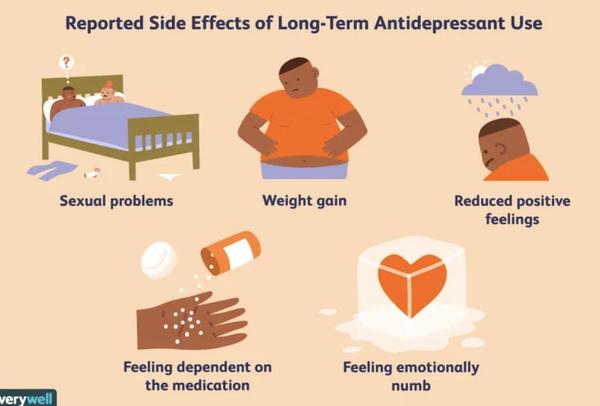It’s days like these that make me so incredibly grateful to get to do what I do in life! I’m about to share with you one of the loveliest journeys off anti-depressants I have ever seen. You’re welcome to hop straight to the video of Meghan’s story below of getting off anti-depressants.
|
There are many reasons people seek help, and often they are resistant to taking a chemical. While this decision is a very personal one, one of the values dearest to my heart is people knowing what decisions they’re REALLY making. For example, if you’re offered a bowl of ice cream by a favorite niece at a birthday party, would you eat it? What if you knew you were diabetic and you would lose consciousness if you ate it? You probably wouldn’t eat it no matter what, in that case.
So, first: to everyone who is suffering from anxiety and depression out there: Dear God, it’s a crazy time. Congratulations on making it through the past few years. Congratulations on putting pants on today, if you did. If not, no pressure. Maybe your world is crazy. Maybe you’re feeling the craziness of the whole world. Whatever it is – good job hanging in there. And I hope this information is extremely helpful to you. What we’re aiming for is – Better Answers.
How to Get Better Answers?
Ask Better Questions!
What do you do when you go to buy a product: You ask good questions.
- Do you look at other makers and models?
- Do you research online reviews and Consumer Reports, or talk to friends and family and find out who’s bought this and if they’re happy?
- Do you pick it up, touch it, shake it, check it out in some way to see if it feels like quality or if it feels cheap?
- Do you think about whether you really need it, and whether it’s worth the amount they’re asking for?
I don’t mean to hurt your feelings, but what do you do when you get prescribed something?
If you’re like most folks, you take what the doctor told you to take, and you take a little pride in being a good patient. What if you also took pride in asking good questions?
 |
With that line of thinking, what if we applied the same process to buying a drug that we applied to buying, say, a car. Or even a good vacuum cleaner! Let’s try it.
- Let’s look at other makes and models. Specifically today, we’re going to look at other ways to solve depression and anxiety, other than pharmaceuticals.
- What does the research say about safety and effectiveness over time? If we’re thinking about a car, let’s think about hidden costs: whether it’s going to require a high investment in maintenance or fuel over time, and what the resale value of the car will be.
- How do you feel when you start it? What does your gut say?
- Do I really need this?
- Is this related to something else I have going on, like The 2020 Bug?
Why look at other makes and models?
While 25 million people are prescribed anti-depressants today (and more of those prescriptions are filled and refilled now than ever before), many of those people report not feeling themselves when they take it. Recent studies have caused the American public to realize that anti-depressants are not as effective as we once thought, and articles published in the New York Times and Huffington Post like “Why Anti-Depressants Don’t Work for Treating Depression” have made these studies some of the most well documented in medical history.
- In 1994, only 3% of older adults were taking antidepressants. Prozac was new to the market, and the other class of drugs, tricyclic antidepressants, were pretty hard on the heart.
- By 2008, 14% of all non-Hispanic white people, 4% of black people, and 3% of Mexican Americans were taking anti-depressants. *This was considered positive by many, as more mental health issues were recognized. That’s one take.
- Almost 25 million adults have been taking anti-depressants for two years or more.
But what else is there?
Well, my daddy is an aircraft mechanic, and he taught me some pretty basic things that seem to work today. Things like, “Where there’s smoke, there’s fire.” That’s a pretty important one when you’re dealing with electronics of the plane!
This common-sense approach has led me to constantly ask a question that seems to get ignored in a lot of medical circles: Why did this happen? When we’re talking about depression and anxiety, Oriental Medicine and functional medicine offer a much more useful lens from that perspective. For example, here are two primary patterns we attribute to depression and anxiety:
- Liver Qi stagnation: this happens when the liver gets overwhelmed with neurochemicals and other chemicals, and those toxic signals make the liver cranky. The person who has this will often be frustrated and irritable.
- Heart heat: this happens when the heart has to deal with too much too quickly. Try drinking 4 cups of a super dark rich coffee with no cream or sugar, and see how jittery you feel. The person who has this will oscillate between feeling anxious and scattered, to overwhelmed and possibly incapable of movement.
Oriental medicine herbal treatment, dietary recommendations, and functional medicine supplements help to resolve and correct liver qi stagnation and heart heat, leading to smoother and healthier emotions.
Safety and effectiveness over time
Some of the side effects of anti-depressants over time are:
- Sexual problems (72%), including the inability to reach orgasm (65%)
- Weight gain (65%)
- Feeling emotionally numb (65%)
- Not feeling like themselves (54%)
- Reduced positive feelings (46%)
- Feeling as if they’re addicted (43%)
- Caring less about other people (36%)
- Feeling suicidal (36%)
What about recent studies indicating anti-depressants and anti-anxiety meds spiking Parkinson’s in women over 65?
How do you feel about it? What does your gut say?
For Meghan, she knew it was the right time for her to come off her anti-depressant because she listened to her intuition. For a long time, I disdained my intuition. Later I realized that was because it didn’t work well, as a result of having an impaired gut. I’ll never forget the moment after I got some deep cleansing work done and I walked around the grocery store getting very strong GUT INSTINCT signals for the first time! It was amazing!
That being said, FEAR short-circuits intuition. If you are acting out of fear, it’s probably not truly intuition. Intuition will say, “Yes!” or “No, not now,” for the most part. If you’re walking home in the dark and you feel someone watching you, that might well be intuition. But if you’re not in immediate physical danger, and you’re feeling a lot of fear or anxiety about something, it might be more of what you’re thinking about than the actual situation. Be careful not to let fear rule your life.
Do I really need it? Is it worth it?
Every chemical that we introduce to our body is going to interact with everything else there. That is one reason why there are 106,000 deaths due to properly prescribed and properly taken medications every year – it is the third leading cause of death in America, even more than car accidents. There simply is no lab that can simulate the conditions of combining several medications together in YOUR BODY. And every body is different. This isn’t a cliché; we are a great diverse neurochemical cocktail with widely varying microbiomes and genes and lifestyles and stress levels. It is impossible to test those real-life conditions in a lab.
So – do you really need it, and is it worth it?
Is this related to something else, like The 2020 Bug?
Short answer: one way or another, probably yes. Here’s why:
Stress and anxiety affect the liver and the heart, and that leads to liver qi stagnation and heart heat. Whether you got sick, you watched others get sick or worse, your job was affected or your lifestyle was, you’ve had more change and stress to deal with in the past few years than you likely have before. AND: whether you got The Bug and knew it, or got it and didn’t know it (most people), or got the shot, you got exposed to an envelope virus and spike proteins. For people who have Long Hauler’s syndrome, what they’re really experiencing is that their bodies didn’t ever fully heal, and they usually just need a little help.
And just because I can hear Dad saying this: “Just because everyone else is doing it doesn’t mean you should!”
If you’re taking a psychiatric drug, you’re in good company because about a third of all Americans are prescribed these medications.
If you know someone we can help, we are very honored to assist you in this journey. Please call today for a free 5-minute consult. Call (941) 923-9355 or email Office@longevitywc.com.
References:
https://www.huffpost.com/entry/depression-medication-why_b_550098
https://www.nytimes.com/2022/11/08/well/mind/antidepressants-effects-alternatives.html
Book: “Whole – Rethinking the Science of Nutrition” by Colin Camplbell, PhD
Movie: “Heal”
https://www.cdc.gov/nchs/fastats/drug-use-therapeutic.htm
https://www.cchrint.org/psychiatric-drugs/people-taking-psychiatric-drugs/





